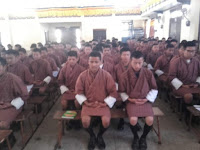How would you encourage students in ecological literacy, an understanding of the interconnectedness and interdependence of all things, and the stewardship of others and the earth? Simple, why not encourage teachers to play with potatoes?It is Saturday, Mrs Pema Wangzom, one of the LME teachers, sits proudly next to a stack of fresh potatoes that she dugout, with the help of the other four teachers. She has been in the garden in, early morning to collect her hard work. It took 4 hours to harvest the product. This was her first potato harvest experience. There is a sense of achievement as she uncovers the potatoes out of the soil.
‘‘This is my first time, harvesting the potatoes. There is so much excitement in digging the soil, and not knowing how many numbers potatoes would emerge. I have learned that mulching and good seed selections are interdependently very important for a good yield. ’’ Said, Pema Wangzom.
Another teacher, Mrs Chimi Wangmo said, ‘‘the garden is not only meant for farmers, but it is also for everybody to take up. When I harvest the product, I get a sense of happiness and feel proud of it. Potato is my favourite food, the harvest gave me the confidence to plant more.’’
Potato is one of the main foods in the daily Bhutanese diet. It is highly compatible, with an essential Bhutanese ingredient, chilli. Potato is the world’s 4th largest crops and is originally from Peru, South America.
Do you know what we had for lunch? With hot red chillies, the freshly boiled potatoes made our lunch healthy, delicious, and conscious, of what we ate. If you were part of the team, you would have experienced the difference between eating one’s own food, and one, that we usually buy from the market. One obvious difference is confidence. To eat something, with a full understanding of what we eat, gives inexpressible confidence. Another difference is we don’t waste the food and begin to appreciate and value them.
The total harvest of 76 kilograms of potatoes, is an opportunity for teachers, to reflect and to calculate the true cost of purchasing local potatoes versus imported potato chips. This calculation made us reflects on the details of the economic and environmental impact of one’s consumer choices and inspires ecological and sustainable responsibility.
Such a realistic experience is a pragmatic strategy, to embed in the consciousness of teachers and students, to help see clearly, the interconnected nature of reality and understand the full benefits and costs of their actions. Through such hands-on experience, they will at the least think twice before they are tempted, to buy packaged chips. They will care deeply for others and for the natural world
Therefore, professional developments for LME teachers happen with the potatoes in the field. The vegetable garden is a means of learning the science that promotes Bhutanese farming traditions, identifying the interconnected and interdependent nature of reality and guiding teachers and students toward stewardship of the earth.












